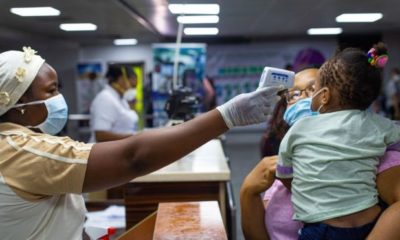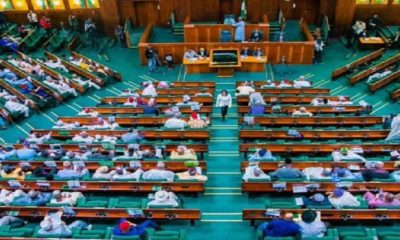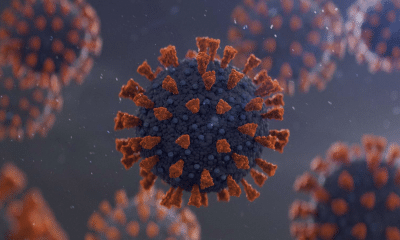World News
Omicron Variant Of COVID-19: What We Know

A wind of panic has blown over the international community since the discovery of a new variant of Covid-19, Omicron, which would be more transmissible.
Why is this new variant “so worrying”?
The new B.1.1.529 variant of the virus that gives Covid 19 , detected for the first time in southern Africa, was classified Friday as “worrying” by the World Health Organization (WHO), and named “Omicron”. “We are announcing today that B.1.1.529 is a variant of concern” and that it is “named Omicron”, said Maria Van Kerkhove, responsible for the management of the Covid-19 epidemic at the WHO.
“The B.1.1.529 variant was first reported to WHO by South Africa on November 24, 2021 (…). This variant has a large number of mutations, some of which are of concern”, said for its part the group of experts tasked by the WHO to monitor the evolution of Covid-19. According to this Technical Advisory Group on Virus Evolution, the first known confirmed infection of Omicron comes from a sample taken on November 9. In recent weeks, infections in South Africa have increased sharply, coinciding with the detection of the new variant.
It has since been detected also in Israel on a person returning from Malawi, Botswana, Belgium and Hong Kong. “We understand that people are worried. The good thing is that we have surveillance systems around the world to detect these variants very quickly”, underlined Ms. Van Kerkhove, calling on the population to reduce their exposure, following in particular barrier gestures, and to be vaccinated.
Never has a new variant caused so much concern in the world since Delta. To facilitate public debates on variants, the WHO names the variants using the names of the letters of the Greek alphabet (alpha, beta, gamma, delta, etc.), which are more accessible to a non-scientific audience and which makes it possible to avoid stigmatizing the country where this variant was initially discovered. According to the WHO expert group, preliminary data suggests that there is “an increased risk of reinfection” with Omicron, compared to other variants of concern
All viruses, including SARS-CoV-2 which is responsible for Covid-19, mutate over time. Most mutations have little or no effect on the properties of the virus. However, certain mutations can affect the properties of a virus and affect, for example, how easily it spreads, the severity of the disease it causes, or the effectiveness of vaccines and drugs.
According to the WHO, a SARS-CoV-2 variant is considered to be of concern when associated with one or more changes, such as increased transmissibility or virulence, decreased effectiveness of health measures public and social or diagnostic tools, vaccines and treatments available.
There were so far 4 other worrying variants: Delta, which represents almost all of the cases sequenced in the world, Alpha, Beta and Gamma.
Immediate measures
France immediately suspends arrivals from seven southern African countries, including South Africa, due to the discovery of a new variant of the particularly worrying coronavirus.
This measure, applied “for a minimum period of 48 hours”, also concerns travelers from Lesotho, Botswana, Zimbabwe, Mozambique, Namibia and Eswatini. “People who have traveled in the last 14 days in one of these countries are invited to report to the authorities and to carry out an RT-PCR screening test as soon as possible”, also adds Matignon.
Other countries have done the same, such as the United States, Canada and Israel.
Will the vaccines be effective?
The German laboratory BioNTech, allied with Pfizer, expects “at the latest in two weeks” of first results of studies which will make it possible to determine if the new variant detected in South Africa is able to escape the vaccine protection, indicated a spokesperson.
“We immediately launched studies on the B.1.1.529 variant” which “clearly differs from the already known variants because it has additional mutations on the spike protein”, characteristic of the SARS-Cov-2 virus, explained the carrier. word to AFP. “Pfizer and BioNTech prepared several months ago to adjust their vaccine in less than six weeks and deliver the first doses in 100 days” if a variant was found to be resistant.
The European regulator for its part declared on Friday that it was “premature” to provide for an adaptation of vaccines to the new variant of Covid-19 detected first in South Africa, while several countries have stopped or restricted flights since Southern Africa.
The European Medicines Agency (EMA) said it needed more details to see if the strain, which has “many mutations”, could escape the four vaccines currently authorized in the European Union.
“We are closely monitoring the newly emerged B.1.1.529 variant, which has many mutations in the spike protein of Covid-19,” Amsterdam-headquartered EMA said in a statement to the ‘AFP.
The stock markets go unscrewed
The European indices have suffered their worst sessions in over a year: Paris fell 4.75%, London 3.64%, Frankfurt 4.15% and Madrid 4.96%. For Paris it is even the worst session since March 18, 2020, when the first confinement was introduced in France. In London, such a decline had not been recorded since June 2020.
The New York Stock Exchange, which will close at 6:00 p.m. GMT for Thanksgiving Bridge, also faltered: around 5:00 p.m. GMT, the Dow Jones lost 2.72%, the extended S & P500 index 2.24%. The predominantly technological Nasdaq yielded 2.10%.
The decline also affected Asian stock markets and oil prices, heavily dependent on expectations of economic activity, which lost more than 10%.










